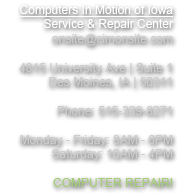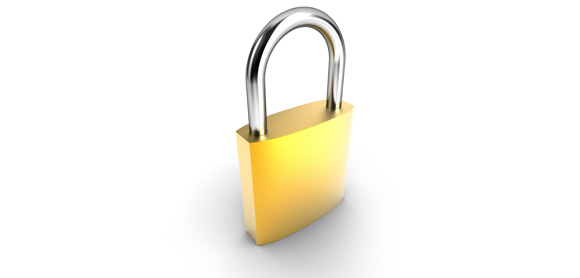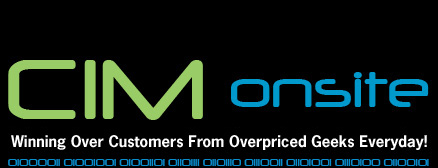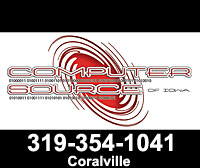Testimonials

Testimonials
From local people
& real businesses
"We had an old server go down which required some quick diagnostics and the acquisition of what turned out to be a hard to find replacement motherboard. Sean Hostetter "saved our bacon" and got us back up and running. Excellent customer service is an extreme understatement of what CIMonsite provided to us. I can't thank you enough for taking care of us."

Testimonials
From local people
& real businesses

Computer Source of Iowa
Service & Repair Center
1714 5th Street
Suite 3
Coralville, IA 52241
Phone: 319-354-1041
Monday-Friday: 10a.m.-6p.m.
Saturday: 10a.m. - 2p.m.
Service & Repair Center
1714 5th Street
Suite 3
Coralville, IA 52241
Phone: 319-354-1041
Monday-Friday: 10a.m.-6p.m.
Saturday: 10a.m. - 2p.m.

Network and Internet Security
Wired and wireless netowrk setup and repair, from a simple two computer in-home wired or wireless network to installing and maintaining wireless networks for large hotels - let CIM Onsite get you connected and keep you connected.Best ways to stay safe online
1. Activate protection
If your operating system or software has a firewall, spam blocker, or other built-in security application, make sure it's turned on.
2. Update and renew
Set your operating system and security software to update automatically.
3. Upgrade your computer and browser
Upgrade to internet Explorer 7 or FireFox 3 browser as both notify you of known forged ['phishing'] websites.
4. Install a toolbar with security features
A good secondary line of defense of supplementary online tools. The Netcraft antiphishing toolbar (toolbar.netcraft.com) warns about known phished sites and can reveal a site's hosting company and even its registered owner. If you go to sites after installing McAfee Site Advisor (www.siteadvisor.com), the program lets you know whether McAfee tested it and, if so, what it found, including viruses, spyware, spam, pop-ups, phishing, and consumer scams. It even overlays its site reports on Web search results and automatically blocks access to sites that exploit browser weaknesses.
5. Shut off your computer
Saving energy is in, and unless you are putting back more energy than you are using, which most of us do not - then going green is easy as shutting off your computer if your not going to use it for awhile.
6. Use public computers with care
Avoid using computers at libraries, hotels, or airports for conducting financial or other personal business. The same goes for using your own computer on a public wireless network, especially if you're not on a secured web page or haven't disabled your system's computer-to-computer connections.
7. Consider a Mac
Mac users have far less issues & problems with viruses and spyware but we all face the same problems with spam and phishing. There is a less ROI in targeting Mac users when the odds are so much better with PCs.
8. Watch what you download
All the free utilities, games and other software on the internet can be useful but many are laden with viruses and spyware. We recommend trusted sites such as: www.download.com, www.snapfiles.com, and www.tucows.com.
9. Consider a suite
For a simple route to broad protection have at least 1GB of RAM when running any of these: Trend Micro, Check Point, McAfee.
10. Run antivirus software
It actually works and you need it. Even if you are a Mac owner, even though chances are far less, they are not ammune to them. An antivirus program will prevent virus-laden files from being tranferred from Macs to PCs.
11. Run two antispyware programs
Spyware is so insidious, and sometimes difficult to detect, that warrants double protection. Set the better of the two programs to block spyware in real time. Use the other to scan whenever you suspect something might have escaped the first program.
12. Use 'disposable' e-mail addresses to thwart spammers
If spam is a problem for you, consider using a disposable address for different purposes. For example, use something like: "yournameshopping09" for buying online. Once that was becomes a problem, just change it to another one. A caution: Gaurd the primary e-mail address you get from your ISP or th eone you like the most, because you can't change that one without abandoning your entire account.
13. Use a credit card
Credit cards offer better protection than other options when shopping online. Even better, some issuers let you generate virtual account numbers that are valid for a single purchase with a fixed dollar limit. Use those and you won't have to give online retailers your permanent card number.
14. Don't assume a certified site is safe
Although it's vital to have a secure connection when sending personal information online (indicated by "https" before the Web address and a padlock or other icon on your browser), it's no guarantee the Website is reputable. Similiarly, certification symbols from the Better Business Bureau, TRUSTe, and simliar organizations provide some reassurance (assuming they're being used with authorization).
15. Gaurd personal information
Never respond to e-mail requesting your passwords, user names, Social Security number, or other personal information, no matter how official it looks. If you're asked to call a telephone number, verify it independently.
16. Avoid using hyperlinks in e-mail
Hyperlinks can show one address but take you another. Before clicking on links in Web pages, hover your cursor over the URL and see whether the address that appears at the bottom of your browser looks as if it's related to a page or site you expect to visit.
17. Type carefully
Tricksters sometimes create lookalike sites that use common mistypings of popular URLs.
18. Report phishing
If you receive a phishing e-mail, forward it to the Anti-Phishing Working Group (reportphishing@antiphishing.org), the Federal Trade Commission (spam@uce.gov), and the company or organization that is being impersonated. You can also file a complaint with the FBI's Internet Crime Complaint Center at www.ic3.gov.
19. Review your accounts regularly
Review your credit card and bank statements as soon as you receive them. Report suspicious charges or withdrawals immediately.




